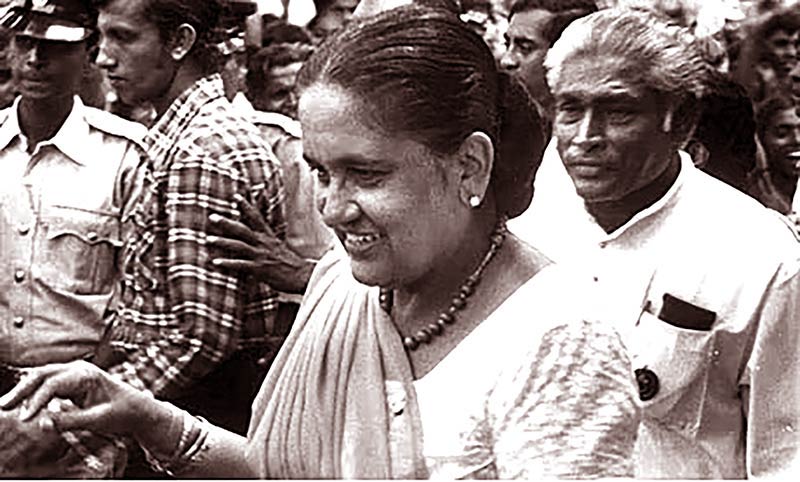Features
Mrs. Bandaranaike stands her ground over misunderstanding with the Maldives

(Excerpted from In Pursuit of Governance, autobiography of MDD Pieris, Secretary to the Prime Minister)
From a large array of issues, one could refer to, I would at this point select just a few others of some interest and importance, which came up during the last two years of the government. One such was an unfortunate misunderstanding with the Maldives. One afternoon, during a period I was acting as Secretary Ministry of Defence and Foreign Affairs, I was with the Attorney General, Mr. Victor Tennekoon, in his Chambers in the Attorney-General’s department, discussing some important legal issues, when there was a frantic call from the Foreign Ministry.
Mr. Ali Manikku, who enjoyed a special official status- with the President of the Maldives, had been searched by our Customs, when he was attempting to enter Sri Lanka for a few days, before proceeding to Singapore. The Customs had found a substantial amount of Foreign currency on his person, and the officer in charge had confiscated this currency and imposed a heavy fine. Mr. Manikku had a diplomatic passport.
The Maldivians were furious. They considered this a gross insult. The Maldivian High Commissioner had wanted to see me immediately. The Prime Minister and WT were out of the country and this was quite serious. I therefore, cut short my discussions with the Attorney General and got back to office to receive the Maldivian High Commissioner. By this time I had rung up DBIPS Siriwardhana, the Principal Collector of Customs, who also thought this should never have happened, but said that technically his officer was right, because any foreign currency being brought into the country should have been declared.
Apparently, it had not happened in this case. That was the Customs version. The Customs officer should however, have been more circumspect, since the passenger held a diplomatic passport. The High Commissioner was quite agitated and emotional about this “Insult” directed at a person of Mr. Manikku’s status and demanded an apology and the punishment of the officer. I did apologize, but I tried to explain to him that whilst the officer showed poor judgment, he had performed his duties in terms of the regulations. The High Commissioner was not satisfied. What he demanded was a formal apology from the government. He was not satisfied with my expression of sincere regret, nor was he prepared to understand the position of the Customs officer.
Matters were simmering in this state, when the Prime Minister came back. An early opportunity was afforded to the High Commissioner to see her. The Prime Minister too was extremely conciliatory and expressed her personal regrets. She explained that the close relations between the two countries should not be affected by a single episode involving an error of judgment by a solitary officer. This had nothing to do with the policy of the government, which was one of close friendship.
The Maldivians were still not mollified. They wanted to send a team of three Ministers to Colombo for discussions. We agreed. Their Minister of Finance, Minister of Fisheries and another Minister arrived and a meeting with the Prime Minister was arranged. I sat in at the meeting. After the preliminary exchange of greetings and pleasantries, the Ministers took up the question of the hurt that had been caused, and the serious effect it had on bilateral relations.
The Prime Minister adopted a tone and manner of deep regret and expressed her personal apologies, but stated that a demand for a public apology constituted in her view a blowing of this episode beyond the realms of reality and reason. But she went out of her way to assuage any hurt feelings. At this point, one of the Ministers became rather curt and aggressive. He told the Prime Minister, that what had happened was an insult to the Maldives, and that in the light of this, they would have to review her relations with Sri Lanka, in the course of which they would have to think about stopping the Maldivian fleet victualing and bunkering in Sri Lanka and sending it to Singapore for these purposes, which would constitute a significant loss of business and foreign exchange to Sri Lanka.
The Minister seemed to have misinterpreted the Prime Minister’s conciliatory stance and expressions of regret for weakness. If one thing could be said of the Prime Minister and whatever other criticisms could be leveled against her or her policies, weakness could certainly not have been one of them. Amidst coups and insurgencies she had amply demonstrated her unruffled and unshakable strength of character.
She was not going to take a threat from anybody. She responded immediately; looked the Minister fully in the eye and in an icy tone said “Mr. Minister, small as we are, sometime ago, when we took
the sovereign decision to nationalize the foreign oil companies operating in Ceylon, the United States cut off all aid to us and even closed down their aid office. We survived. We have also survived many other hazards. When you stop sending your fleet to Colombo and divert it to Singapore, we will still survive.”
The two other Maldivian Ministers were visibly upset about their colleague’s blunder. They apologized profusely. So did the Minister who made the offending remark. But the Prime Minister has had enough. She informed them politely and firmly that we had sincerely regretted this incident, which was pure accident, and also expressed our regrets. If they were not satisfied, it was entirely up to them to take whatever steps, they considered necessary. As far as we were concerned, there was nothing further we could do. Thus ended the discussion. The matter was not pursued thereafter, and gradually the whole episode was forgotten.